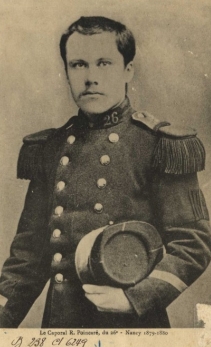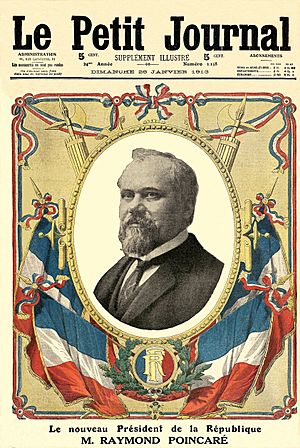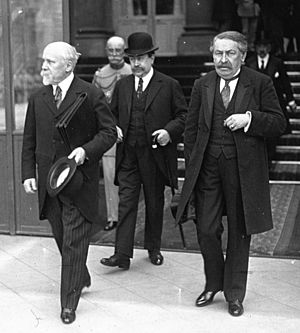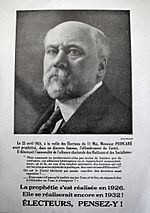Raymond Poincaré facts for kids
Quick facts for kids
Raymond Poincaré
|
|
|---|---|
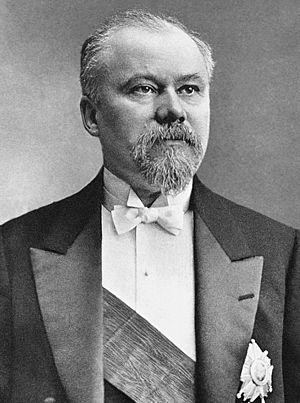
Official portrait, 1913
|
|
| President of France | |
| In office 18 February 1913 – 18 February 1920 |
|
| Prime Minister | Aristide Briand Louis Barthou Gaston Doumergue Alexandre Ribot René Viviani Paul Painlevé Georges Clemenceau Alexandre Millerand |
| Preceded by | Armand Fallières |
| Succeeded by | Paul Deschanel |
| Prime Minister of France | |
| In office 23 July 1926 – 29 July 1929 |
|
| President | Gaston Doumergue |
| Preceded by | Édouard Herriot |
| Succeeded by | Aristide Briand |
| In office 15 January 1922 – 8 June 1924 |
|
| President | Alexandre Millerand |
| Preceded by | Aristide Briand |
| Succeeded by | Frédéric François-Marsal |
| In office 21 January 1912 – 21 January 1913 |
|
| President | Armand Fallières |
| Preceded by | Joseph Caillaux |
| Succeeded by | Aristide Briand |
| Minister of Foreign Affairs | |
| In office 15 January 1922 – 8 June 1924 |
|
| Prime Minister | Himself |
| Preceded by | Aristide Briand |
| Succeeded by | Edmond Lefebvre du Prey |
| In office 14 January 1912 – 21 January 1913 |
|
| Prime Minister | Himself |
| Preceded by | Justin de Selves |
| Succeeded by | Charles Jonnart |
| Minister of Finance | |
| In office 23 July 1926 – 11 November 1928 |
|
| Prime Minister | Himself |
| Preceded by | Anatole de Monzie |
| Succeeded by | Henry Chéron |
| In office 14 March 1906 – 25 October 1906 |
|
| Prime Minister | Ferdinand Sarrien |
| Preceded by | Pierre Merlou |
| Succeeded by | Joseph Caillaux |
| In office 30 May 1894 – 26 January 1895 |
|
| Prime Minister | Charles Dupuy |
| Preceded by | Auguste Burdeau |
| Succeeded by | Alexandre Ribot |
| Minister of Education | |
| In office 26 January 1895 – 1 November 1895 |
|
| Prime Minister | Alexandre Ribot |
| Preceded by | Georges Leygues |
| Succeeded by | Émile Combes |
| In office 4 April 1893 – 3 December 1893 |
|
| Prime Minister | Charles Dupuy |
| Preceded by | Charles Dupuy |
| Succeeded by | Eugène Spuller |
| Personal details | |
| Born |
Raymond Nicolas Landry Poincaré
20 August 1860 Bar-le-Duc, France |
| Died | 15 October 1934 (aged 74) Paris, France |
| Political party | Democratic Republican Alliance |
| Spouse |
Henriette Benucci
(m. 1904) |
| Alma mater | University of Nantes University of Paris |
| Signature |  |
Raymond Nicolas Landry Poincaré (born August 20, 1860 – died October 15, 1934) was an important French leader. He served as President of France from 1913 to 1920. He was also the Prime Minister of France three different times.
Poincaré was trained as a lawyer. He was elected to the French parliament in 1887. He later helped create the Democratic Republican Alliance party. This party became very important in France. He was known for his strong feelings against Germany. He worked to make France's alliance with Russia stronger before World War I.
After the war, Poincaré became Prime Minister again in 1922. He ordered French troops to occupy a part of Germany called the Ruhr in 1923. This was to make sure Germany paid for war damages. He served his last term as Prime Minister from 1926 to 1929.
Contents
Early Life and Education
Raymond Poincaré was born in Bar-le-Duc, France. His mother, Nanine Marie Ficatier, was very religious. His father, Nicolas Antonin Hélène Poincaré, was a respected government worker and a weather expert. Raymond was also the cousin of Henri Poincaré, a very famous mathematician.
Raymond studied at the University of Paris. He became a lawyer at just 20 years old, making him the youngest lawyer in France at the time. As a lawyer, he successfully defended the famous writer Jules Verne. Verne was sued by a chemist who claimed a character in Verne's book Facing the Flag was based on him. At 26, Poincaré was elected to the Chamber of Deputies, which is like a parliament. This made him the youngest deputy there too.
Early Political Career
Poincaré started his political career in the Department of Agriculture. In 1887, he was elected as a deputy for the Meuse region. He quickly became known as a smart economist in the Chamber. He worked on important budget committees.
He served as a minister in several governments. He was Minister of Education, Fine Arts, and Religion in 1893. He also served as Minister of Finance in 1894-1895. In 1902, he helped create the Democratic Republican Alliance (ARD) party. This party became a major force in French politics.
Poincaré also kept his law practice while being a politician. He wrote many essays about literature and politics. His political ideas were sometimes called "Poincarism." This term meant different things over time. Before World War I, it meant preparing France for possible threats. After the war, it referred to his support for business and finance.
First Time as Prime Minister
Poincaré became Prime Minister in January 1912. He took strong control over France's foreign policy. He wanted to make sure France was ready for any challenges. He had very strong feelings against Germany. He believed Germany was becoming too powerful. He wanted to change the balance of power in Europe.
He worked to strengthen France's alliance with the Russian Empire. In 1912, he visited the Russian Tsar Nicholas II. He wanted to make sure France and Russia would support each other if there was a war. Poincaré also wanted France to expand its influence in the Middle East. He saw the victory of the Balkan countries in the First Balkan War as a way to make France and its allies stronger.
President of France
Poincaré was elected President of the Republic in 1913. He was the first president in a long time who tried to make the office more powerful. He didn't want it to be just a ceremonial role. He believed war was coming and worked to prepare France.
The July Crisis of 1914
In July 1914, Poincaré was visiting Russia to strengthen the alliance. While he was there, news came about the assassination of Archduke Franz Ferdinand. This event started the July Crisis, which led to World War I.
Poincaré promised Russia that France would support them against Austria-Hungary and Germany. He talked about winning a war, not just avoiding one. He later tried to hide how much he had promised Russia. He approved of Russia's military preparations. France also moved its troops closer to the German border. Poincaré wanted Britain to see France as innocent in the conflict.
On July 31, Germany warned Russia to stop its military preparations. France also began preparing its army. Poincaré supported this. On August 1, France officially began its general military preparations. Germany declared war on France on August 3. Poincaré said the declaration was "received with such satisfaction." He told the French people that they would unite to defend their country.
During and After the War
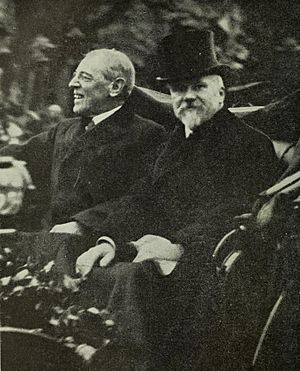
As the war continued, Poincaré's influence lessened. This was especially true after Georges Clemenceau became Prime Minister in 1917. Poincaré believed the war ended too soon. He thought the French army should have gone deeper into Germany.
At the Paris Peace Conference of 1919, Poincaré wanted France to control the German Rhineland. He wanted it to be under Allied military control for a long time. He considered resigning when the peace treaty was approved. However, he decided to stay.
Second Time as Prime Minister
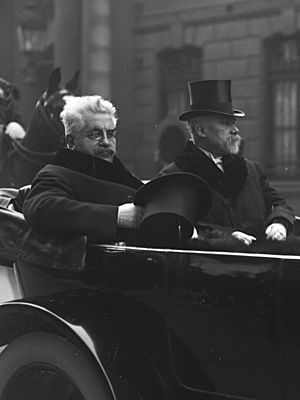
In 1920, Poincaré's term as President ended. Two years later, he became Prime Minister again. He continued his strong policies against Germany. Germany was not paying its war damages (reparations). Poincaré wanted France and Britain to work together to make Germany pay.
In 1922, he was worried when Germany and Soviet Russia signed the Treaty of Rapallo. This treaty challenged the peace agreement after World War I. Poincaré felt that France might have to act alone if Britain didn't agree.
Some people, especially in Germany and Russia, blamed Poincaré for starting World War I. They called it Poincaré-la-guerre (Poincaré's war). This idea was spread through propaganda.
In December 1922, Poincaré decided to take action. On January 11, 1923, he ordered French troops to occupy the Ruhr region in Germany. This was to force Germany to pay the reparations. This action was profitable for France. It helped France get money for rebuilding its damaged areas. However, it also caused problems with Germany's economy.
Poincaré's government lost the 1924 elections. This was partly because of financial problems in France.
Third Time as Prime Minister
France faced another financial crisis in 1926. This brought Poincaré back to power as Prime Minister and Finance Minister. He worked to stabilize the French currency, the franc. His policies were very popular. His party won the 1928 general election.
Poincaré had also introduced a law in 1915. This law allowed the government to take away French citizenship from people who had become citizens but still kept their old nationality, especially if they were from "enemy origins." A later law in 1927 allowed the government to remove citizenship from new citizens who acted against France's interests.
Retirement and Death
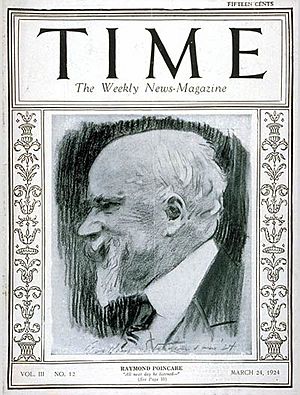
Due to poor health, Raymond Poincaré resigned as Prime Minister in July 1929. He refused to serve another term. He passed away in Paris on October 15, 1934, at the age of 74.
Family
Raymond Poincaré had a brother named Lucien Poincaré (1862–1920). Lucien was a physicist and became a high-ranking inspector of public education. He wrote books about modern physics and electricity.
His first cousin was Jules Henri Poincaré (1854–1912). Henri was an even more famous physicist and mathematician.
See also
 In Spanish: Raymond Poincaré para niños
In Spanish: Raymond Poincaré para niños
- French entry into World War I
- Interwar France
 | Jackie Robinson |
 | Jack Johnson |
 | Althea Gibson |
 | Arthur Ashe |
 | Muhammad Ali |


